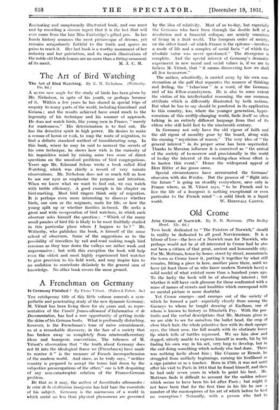A Frenchman on Germany
Is Germany Finished ? By Pierre Vienot. (Faber & Faber. 5s.) THE catchpenny title of this little volume conceals a sym- pathetic and penetrating study of the new dynamic Germany. M. Vienot has been living there for six years and, as repre- sentative of the candle franco-allemand d'Information et de Documentation, has had a rare opportunity of getting inside the skins of his German hosts. What is profoundly disturbing, however, is the Frenchman's tone of naive astonishment, as at a remarkable discovery, in the face of a society that has broken away so completely from nineteenth-century ideas and bourgeois conventions. The triteness of M. Vienot's. observation that "the truth about Germany does not fit into the ideological frame we [Frenchmen] have made to receive it" is the measure of French incomprehension of the modern world. And since, as he truly says, "neither 'country is prepared to accept the terms laid down by the subjective preoccupations of the other," one is left despairing of any non-catastrophic solution of the Franco-German problem.
Be that as it may, the author of Incertitudes allemandes : :la crise de la civilization bourgeoise has laid bare the essentials of his subject. Germany is the microcosm of a world in *which social no less than physical phenomena are governed by the idea of relativity. Most of us to-day, but especially the Germans who have been through the double hell of a revolution and a financial collapse, are acutely conscious of living in a fluid world. The bourgeois order of society, on the other hand—of which France is the epitome—involves a mode of life and a complex of social facts "of which the absolute value was never questioned." The divergence is complete. And the special interest of Germany's dramatic experiment in new moral and social values is, if we are to believe M. Vienot, that "it means discovering how we shall all live to-morrow."
The author, admittedly, is carried away by his own con- sternation at the gulf that separates the manner of thinking and feeling, the " behaviour " in a word, of the Germans and of his fellow-countrymen. He is also to some extent the victim of his intellectualist reasoning, the one common attribute which is differently illustrated by both nations. But what he has to say should be pondered in its application to this country, too, where the younger generation, hyper- conscious of this swiftly-changing world, finds itself so often talking in an entirely different language from that of its elders who still hold fast to the nineteenth century.
In Germany not only have the old vigour of faith and the old rigour of morality gone by the board, along with the ensuing "mysticism of reason." The very idea of "the general interest" in its proper sense has been superseded. Thanks to Marxian influence it is conceived as "the arrival of the society of to-morrow and provisionally in the world of to-day the interest of the working-class whose effort is to hasten this event." Hence the widespread appeal of Herr Hitler et hoc genus omne.
Special circumstances have accentuated the Germans' obsession with das Werden. But the process of "flight into the future" is going on steadily everywhere, save only in France where, as M. Vienot says, "to be French and to live the life of a bourgeois is nothing exceptional or even particular to the French mind "—a solid block in a liquid


































 Previous page
Previous page